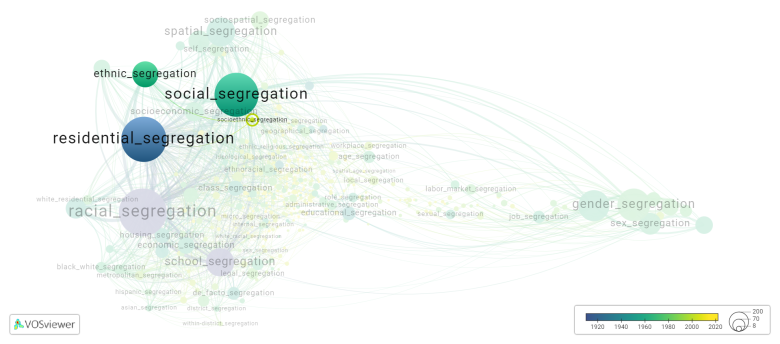Socioethnic segregation
Date and country of first publication[1][edit | edit source]
2010
United Kingdom
Definition[edit | edit source]
Socio-ethnic segregation refers to the separation of different social and ethnic groups within a society. It involves the physical, social, and economic separation of individuals or communities based on their social class, income, or ethnicity.
There are several factors that contribute to socio-ethnic segregation, including historical patterns of discrimination, economic disparities, cultural differences, and government policies. These factors can lead to the creation of segregated neighborhoods, schools, and workplaces, where different social and ethnic groups live, study, and work separately from one another.
Socio-ethnic segregation can have significant social and economic implications. It can perpetuate inequalities, limit social mobility, and reinforce social divisions between different groups. It can also lead to social exclusion, marginalization, and discrimination, as individuals from disadvantaged groups may face barriers in accessing resources and opportunities.
Efforts to address socio-ethnic segregation often involve policies and interventions aimed at promoting social integration, reducing economic disparities, and fostering cultural understanding. These may include the development of affordable housing in diverse neighborhoods, the implementation of inclusive education policies, and the promotion of equal employment opportunities.
Overall, socio-ethnic segregation is a complex and multifaceted issue that requires comprehensive approaches to promote social cohesion and equality within societies.
Synonyms[edit | edit source]
The following terms are synonymous with socioethnic segregation:
ethnic social segregation; ethno social segregation; social ethnic segregation; socio ethnic segregation.
References and literature addressing this segregation form under these synonymous terms can be found below.
See also[edit | edit source]
Related segregation forms[edit | edit source]
Socioethnic segregation is frequently discussed in the literature with the following segregation forms:
social segregation, residential segregation, ethnic segregation

This visualization is based on the study The Multidisciplinary Landscape of Segregation Research.
For the complete network of interrelated segregation forms, please refer to:
References[edit | edit source]
Notes[edit | edit source]
- ↑ Date and country of first publication as informed by the Scopus database (December 2023).
At its current state, this definition has been generated by a Large Language Model (LLM) so far without review by an independent researcher or a member of the curating team of segregation experts that keep the Segregation Wiki online. While we strive for accuracy, we cannot guarantee its reliability, completeness and timeliness. Please use this content with caution and verify information as needed. Also, feel free to improve on the definition as you see fit, including the use of references and other informational resources. We value your input in enhancing the quality and accuracy of the definitions of segregation forms collectively offered in the Segregation Wiki ©.
Socioethnic segregation appears in the following literature[edit | edit source]
Arbaci S., Malheiros J. (201). De Segregation, peripheralisation and the social exclusion of immigrants: Southern European Cities in the 1990s. Journal of Ethnic and Migration Studies, 36(2), 227-255. https://doi.org/10.1080/13691830903387378
Demanet J., Van Houtte M. (2014). Social ethnic school composition and disengagement: An inquiry into the perceived control explanation. Social Science Journal, 51(4), 659-675. Elsevier Inc..https://doi.org/10.1016/j.soscij.2014.09.001
Schiff C. (2014). Experiencing ethnicity in a colour blind system: Minority students in France. Migrant, Roma and Post-Colonial Youth in Education Across Europe: Being 'Visibly Different', 167-183. Palgrave Macmillan.https://doi.org/10.1057/9781137308634_11
Éric F. (2014). (Sexual) whiteness and national identity: Race, class and sexuality in colour blind France. Theories of Race and Ethnicity: Contemporary Debates and Perspectives, 233-250. Cambridge University Press.https://doi.org/10.1017/CBO9781139015431.018
Arie Y., Mesch G.S. (2016). The Spatial and Social Network Dimensions of Mobile Communication: A Test of the Social Stratification and Social Diversification Hypotheses. Communication Research, 43(5), 713-734. SAGE Publications Inc..https://doi.org/10.1177/0093650215573961
Burneika D., Ubarevičiene R. (2016). Socio ethnic segregation in the metropolitan areas of Lithuania. Sociologicky Casopis, 52(6), 795-819. Sociologicky Ustav.https://doi.org/10.13060/00380288.2016.52.6.287
Kim H.-R. (2017). Contentious politics in the nascent formation of ethnic communities in Korea. Korea Observer, 48(3), 577-607. Institute of Korean Studies.https://doi.org/
Burneika D., Ubarevičiene R. (2017). Socio ethnic segregation in the metropolitan areas of Lithuania. A+BE Architecture and the Built Environment, 9(), 209-234. TU Delft.https://doi.org/
Kende Á., Szalai J. (2018). Pathways to early school leaving in Hungary: Ethnicised inequalities in education and the case of Roma youth. Comparative Perspectives on Early School Leaving in the European Union, 33-46. Taylor and Francis.https://doi.org/10.4324/9781315170404
